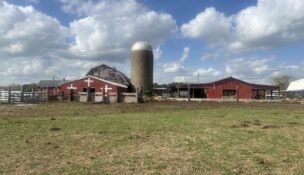Financial losses
Rural communities struggle with shrinking access to banking
Jenny Boone //January 31, 2020//
Financial losses
Rural communities struggle with shrinking access to banking
Jenny Boone //January 31, 2020//
When one of Caroline County’s two banks, Virginia National Bank, shut its doors six years ago, Gary Wilson, the county’s director of economic development, wanted to do something about it. He launched a widespread effort to find a second banking institution to open a branch in Caroline, which is sandwiched between Fredericksburg and Richmond.
“I got no takers,” he says, adding that the county’s population of about 30,000 likely was not an impressive draw.
Without another bank in town, residents patronize Atlantic Union Bank, the only other bank in the county, or they drive about 15 miles to one of the nearest localities, such as Ashland. That’s especially inconvenient for retail businesses needing to make cash deposits, Wilson says.
“At this point, any new business that comes to the community, we always tell them about Atlantic Union, which is no longer a potential faux pas or conflict of interest,” he says. “It’s our only [bank].”
Caroline County’s challenges are not unlike those facing many small communities across Virginia and the nation.
Caroline is one of four largely rural Virginia counties categorized in a national November report by the Federal Reserve Board as deeply affected by bank branch closures. All of the counties listed by state, which in Virginia include Bland, Lunenburg and Surry, had 10 or fewer branches in 2012, and they lost at least 50% of those branches by 2017. About 89% of the counties named in the report are rural, containing fewer bank branches per 100 square miles than other rural counties nationally. Other Federal Reserve Banks in the country, including the Federal Reserve Bank of Richmond, had parts in preparing the report.
It’s not a secret that the number of bank branches in the state and nationwide is shrinking. Five years ago, there were 120 banks operating in Virginia, compared with 100 currently, says Bruce Whitehurst, president and CEO of the Virginia Bankers Association.
Banking experts point to a variety of reasons for this trend, from increases in bank mergers and branch consolidations to the growing use of online banking. There also are significant challenges specific to some rural communities, such as shrinking customer populations, poor broadband access and lack of adequate local talent to fill bank jobs.
“Banks are going to go where the business is,” says Brian Plum, CEO of Luray-based Blue Ridge Bank and past chairman of the Virginia Association of Community Banks. “In the banking business, it’s not just what you are going to do today but calculate what you will do tomorrow.”
‘A real gap’
Bank closures have a particularly negative impact on rural communities because in many of these areas, broadband access is limited or nonexistent, making online banking difficult or impossible for consumers.
Also, rural areas hit hardest by bank closures tend to have greater populations of older, poor and less educated people, compared with other rural communities, according to the Federal Reserve report.
The challenges surrounding bank access in rural communities are a focus for Tom Barkin, president and CEO of the Federal Reserve Bank of Richmond. In October, the bank held a conference in Harrisonburg to discuss economic and social challenges affecting the health of rural areas.
“The loss of banks creates direct costs in terms of residents’ access to financial services, but there are also large indirect costs,” said Barkin in a statement. “Anchor institutions like banks provide civic leaders and high-skilled workers who can raise the aspirations of those around them. They invest in their communities, educate others about finances, create incentives for other business and signal a community’s vibrancy.”
Take Surry County, a community of about 6,500 situated in the southeastern part of Virginia. Retired couple Dave and Diane Sheldon started a vineyard there in 2007 and moved to Surry from Massachusetts in 2010. After starting the vineyard, they opened Hampton Roads Winery LLC.
Surry had only two bank branches when the Sheldons came to the county, and one, a BB&T branch, closed four years ago. Now, Sonabank, a Virginia chartered bank with numerous locations in the state and neighboring states, is the only bank in Surry.
The Sheldons have one account with Sonabank and hold other accounts, including their mortgage, with SunTrust (now in the process of being rebranded as Truist following its merger with BB&T) — but the nearest SunTrust branches are 45 minutes away in Suffolk, Williamsburg and Hopewell. Dave Sheldon largely banks online with SunTrust, but sometimes the 45-minute drive can’t be avoided.
Banking hassles aside, Sheldon never realized at the time that he opened the wine business how little traffic would come from Surry County. Because of that, the Sheldons have been ramping up the winery’s wholesale business. In about four years, they plan to open a distribution hub — but it may not be located in Surry.
Anna Hansen, associate broker at Surry Side Realty, says the lack of local bankers for business loans and other financial services in Surry County is a problem. Also, it is especially difficult for some small business owners to get loans, largely because comparable enterprises do not exist locally, she says.
“I wish I had a ton of money to start a private bank,” Hansen says. “We have a real gap in rural communities in lending, and we have a real lack of financial literacy.”
To be sure, not all Virginia communities with few bank branches are struggling from a lack of banking options, according to some economic development and business professionals. Whitehurst says he doesn’t hear about many bank access problems in rural areas of the state, adding that community banks often do strong business in these communities.
In Southwestern Virginia’s Bland County, for instance, there are only two banks, and that doesn’t seem to be a problem for some residents, says Bland County Administrator Eric Workman. First Sentinel Bank opened a branch there in 2018 after New Peoples Bank closed its branch in 2014, citing a decreasing volume of deposits and foot traffic. BB&T (now Truist Financial Corp.) is the other branch in Bland. County residents will drive about 15 to 25 minutes to Wytheville or Bluefield for other banking options, Workman says.
Similarly, Lunenburg County, a Southern Virginia community with a population of approximately 12,000, likely could not support additional bank branches, says Glenn Millican, the county’s planner. Benchmark Community Bank is the only bank in the county, with two branches.
Nevertheless, Millican agrees that poor broadband access in the county has been “a definite deterrent to new business formation.”
‘Rural equals fewer choices’

Bill Baker, a broker at United Country Virginia Realty in Clarksville, says some of his clients work with out-of-town or even out-of-state mortgage brokers. And if they have to drive 20 minutes to go to the bank, it’s not a big deal because they’re accustomed to traveling that distance for other amenities, too, he says.
“The reality is rural equals fewer choices,” Baker says.
Some community banks, like Powell Valley National Bank, are coming up with ways to bridge the digital divide with customers, often the elderly, who may not be technologically savvy. Powell Valley, headquartered in Jonesville, sends some of its clients a text message, with their approval, to notify them of important account activity, such as if a balance drops below a certain level or if a Social Security check is deposited.
“One of the things that we need to do as an industry is to continue to find ways to utilize technology for older folks, particularly in rural areas, who may not be inclined themselves to do it,” says Leton Harding, president, chairman and CEO of Powell Valley.
Even so, Millican and other state economic development officials say access to broadband is a bigger business issue than lack of bank branches in rural areas. Local governments and even Gov. Ralph Northam are working on initiatives that may improve broadband availability in these areas.
“To me, the challenge of bank branch closures is a piece of the larger puzzle of ‘how do we fix economic growth in the rural areas?’” says Plum of Blue Ridge Bank.
Meanwhile, there is growth on the horizon for Caroline County, perhaps boosting bank prospects for the future. Several large residential developments are planned and could increase the county’s population over time, Wilson says.
“It will be better for retail and banking,” he says. “We’re encouraged that the future is going to be brighter.”
Banks & thrifts
| Institution | City | Phone | Website | Top executive | Va. offices | 2019 deposits ($000)1 | |
|---|---|---|---|---|---|---|---|
| 1 | Capital One Bank USA2 | McLean | (877) 383-4802 | capitalone.com | Richard D. Fairbank | 1 | $77,502,585 |
| 2 | E*Trade Bank4 | New York; regional HQ in Arlington | (800) 387-2331 | us.etrade.com | Michael A. Pizzi | 1 | 40,745,948 |
| 3 | Wells Fargo & Co. | San Francisco; regional HQ in McLean | (800) 869-3557 | wellsfargo.com | Charles W. Scharf | 253 | 35,067,748 |
| 4 | Bank of America | Charlotte, N.C. | (800) 432-1000 | bankofamerica.com | Brian Moynihan | 121 | 32,506,755 |
| 5 | Capital One, National Association2 | McLean | (877) 383-4802 | capitalone.com | Richard D. Fairbank | 43 | 24,820,189 |
| 6 | BB&T Corp. (Truist Financial Corp.)3 | Winston-Salem, N.C. | (800) 226-5228 | bbt.com | Kelly S. King | 444 | 23,262,957 |
| 7 | SunTrust Bank (Truist Financial Corp.)3 | Atlanta | (800) 786-8787 | suntrust.com | William H. Rogers Jr. | 444 | 20,461,466 |
| 8 | Atlantic Union Bank | Richmond | (800) 990-4828 | atlanticunionbank.com | John Asbury | 145 | 12,169,312 |
| 9 | TowneBank | Portsmouth | (757) 391-3500 | townebank.com | G. Robert Aston Jr. | 32 | 7,173,924 |
| 10 | United Bank | Charleston, W.Va. | (800) 327-9862 | bankwithunited.com | Richard M. Adams | 70 | 6,979,276 |
| 11 | PNC Bank, National Association | Pittsburgh | (888) 762-2265 | pnc.com | William S. Demchak | 95 | 4,020,011 |
| 12 | Carter Bank & Trust | Martinsville | (276) 656-1776 | carterbankandtrust.com | Litz H. Van Dyke | 76 | 3,178,536 |
| 13 | Burke & Herbert Bank | Alexandria | (703) 549-6600 | burkeandherbertbank.com | E. Hunt Burke | 25 | 2,398,132 |
| 14 | E*Trade Savings Bank4 | Arlington | (800) 387-2331 | us.etrade.com | Karl A. Roessner | 1 | 1,970,498 |
| 15 | TD Bank, National Association | Cherry Hill, N.J. | (800) 462-3666 | tdbank.com | Bharat B. Masrani | 24 | 1,966,651 |
| 16 | Sonabank | McLean | (888) 464-2265 | sonabank.com | Georgia S. Derrico | 41 | 1,863,331 |
| 17 | Citibank, National Association | New York | (212) 559-1000 | citibank.com | Mary McNiff | 6 | 1,852,000 |
| 18 | First-Citizens Bank & Trust Co. | Raleigh, N.C. | (888) 323-4732 | firstcitizens.com | Frank B. Holding Jr. | 47 | 1,745,537 |
| 19 | American National Bank and Trust Co. | Danville | (800) 240-8190 | amnb.com | Jeffrey V. Haley | 22 | 1,514,386 |
| 20 | First Bank & Trust Co. | Lebanon | (276) 889-4622 | firstbank.com | Mark Nelson | 23 | 1,390,718 |
| 21 | Citizens and Farmers Bank | West Point | (800) 296-6246 | cffc.com | Tom Cherry | 25 | 1,212,302 |
| 22 | Sandy Spring Bancorp Inc. | Olney, Md. | (800) 399-5919 | sandyspringbank.com | Daniel J. Schrider | 15 | 1,191,791 |
| 23 | FVCbank | Fairfax | (703) 952-3277 | fvcbank.com | David W. Pijor | 6 | 1,169,739 |
| 24 | John Marshall Bank | Reston | (703) 584-0840 | johnmarshallbank.com | Christopher W. Bergstrom | 6 | 1,133,707 |
| 25 | National Bank of Blacksburg | Blacksburg | (540) 951-6228 | nbbank.com | F. Brad Denardo | 25 | 1,069,940 |
1 As of June 30, 2019 for deposits within Virginia.
2 Subsidiary of Capital One Financial Corp. Capital One Bank is located in Virginia, but it provides banking across the U.S.
3 BB&T and SunTrust completed a merger into Truist Financial Corp. in December 2019. Both brands will publicly transition to Truist by 2022.
4 E*Trade Bank is located in Virginia, but its office provides online banking across the U.S.
Source: Federal Deposit Insurance Corp., Deposit Market Share Report, June 30, 2019
-


















